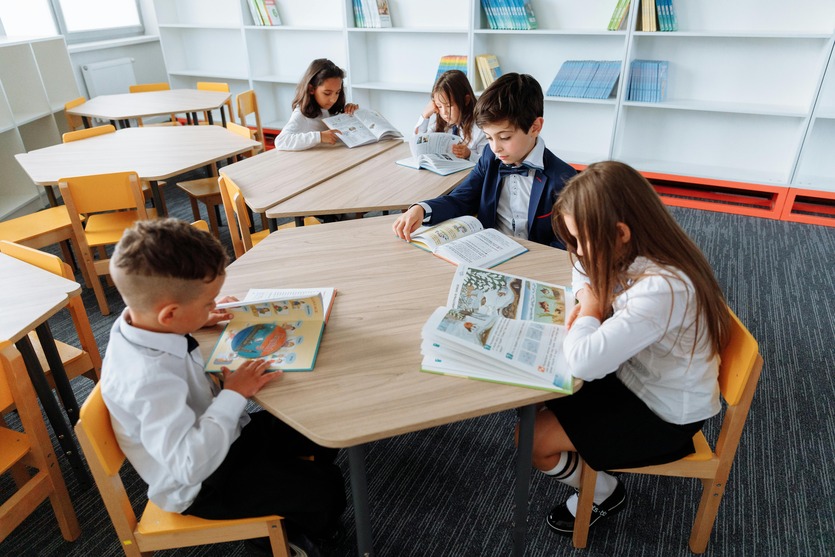As parents, we all want our kids to thrive academically and develop strong reading and writing skills. These foundational abilities not only set the stage for academic success but also boost your child’s confidence and creativity. If you’re wondering, “How can I improve my child’s reading and writing skills?” you’re in the right place! Here are some simple, fun, and effective ways to help your child become a better reader and writer.
1. Create a Reading-Friendly Environment
Setting up a cosy and inviting space for reading can work wonders. Designate a special corner in your home filled with a variety of books that cater to your child’s age and interests. It doesn’t have to be fancy; a comfy chair, a small bookshelf, and good lighting are all you need.
As a parent, you can also be a great role model. Let your child see you enjoying a good book or magazine. When they see you reading, they’ll understand that reading is a valuable and enjoyable activity.
Make regular visits to libraries or bookshops part of your routine. Allow your child to explore and pick out books that catch their eye. This makes reading feel like an exciting adventure rather than a chore.
2. Make reading fun.
Transform reading into a delightful experience! Use different voices and expressions when reading aloud. This not only makes the story more engaging but also helps your child develop their listening and comprehension skills. Invite them to join in with sound effects or repeat phrases for added fun.
Incorporate reading into everyday activities. Read signs, labels, and menus together when you’re out and about. This helps your child see the practical side of reading and keeps them interested.
Creating a reading chart can also be a motivating way to track progress. Use stickers or a small reward system to celebrate their reading milestones.
3. Encourage writing through Fun activities.
Writing doesn’t have to be all about formal lessons. Start a journal or diary with your child where they can write about their day, their thoughts, or their dreams. It’s a wonderful way for them to express themselves and practice writing.
Playing word games like Scrabble or Hangman can make writing practice enjoyable. These games are great for building vocabulary and spelling skills while having fun.
Encourage your child to write letters or create greeting cards for family members. It’s a meaningful way to practice writing and stay connected with loved ones.
4. Assign Proper Tools and Materials
Numerous resources are available to facilitate the process of learning to read and write. Look through kid-friendly websites and apps that offer education. Interactive writing and reading tasks are available in many of these tools, which can enhance the learning experience.
Purchasing workbooks suitable for the child’s age can also be beneficial. These workbooks offer focused writing and reading understanding guidance.
Another helpful resource for increasing vocabulary and spelling is a set of cards. They may be included in your child’s everyday routine and are simple to use.
5. Provide Support
Inspiration has a powerful impact! Honour your child’s successes, no matter how minor. To keep them motivated, celebrate their achievements and hard work.
In a polite way, offer helpful feedback. If they make mistakes, encourage them and provide direction so they can get better. Keep in mind that each child learns differently, so be patient and supportive of them as they progress.
Conclusion:
Improving your child’s reading and writing skills is a gradual process that involves patience, encouragement, and fun. By creating a supportive environment, making reading enjoyable, and providing the right tools, you can help your child develop strong literacy skills. So, the next time you wonder, “How can I improve my child’s reading and writing skills?” remember these tips and enjoy the journey together!
FAQs:
Q1: What age should I start helping my child with reading and writing?
A1: It’s great to start introducing reading and writing activities as early as preschool. Engaging with books and simple writing exercises can lay a strong foundation for their future skills.
Q2: How can I make reading more exciting for my child?
A2: You can make reading fun by using animated voices, creating a cozy reading nook, and turning reading time into a special activity. Let your child pick books that interest them and make regular library visits a part of your routine.
Q3: My child struggles with writing. What can I do to help?
A3: Encourage your child to write about things they enjoy, like keeping a journal or writing letters to family members. Play word games and use educational apps to make writing practice more engaging and less stressful.
Q4: Are there specific tools or resources that can aid in improving my child’s reading and writing skills?
A4: Yes! Educational apps, interactive websites, age-appropriate workbooks, and flashcards can be very helpful. These tools can provide targeted practice and make learning more interactive.
Q5: How can I support my child if they are not making progress with their reading and writing skills?
A5: Be patient and supportive. Offer encouragement and celebrate small victories. If progress is slow, consider seeking additional help from a tutor or educational specialist who can provide personalised guidance.




